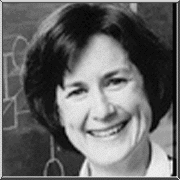 Dr.
Mary-Claire King was born in a suburb of Chicago in 1946.
She received her bachelor's degree in mathematics at age 19 from
Carleton College in Minnesota. Then went on to the University of
California at Berkeley's graduate program in genetics, where she
eventually became a professor in the School of Public Health and the
Department of Molecular and Cell Biology. It was here King became the
first person to introduce the idea that familial breast cancer could
be traced to a particular gene. In 1990 she proved the existence of
the gene for hereditary breast cancer, now known as BRCA1.
Dr.
Mary-Claire King was born in a suburb of Chicago in 1946.
She received her bachelor's degree in mathematics at age 19 from
Carleton College in Minnesota. Then went on to the University of
California at Berkeley's graduate program in genetics, where she
eventually became a professor in the School of Public Health and the
Department of Molecular and Cell Biology. It was here King became the
first person to introduce the idea that familial breast cancer could
be traced to a particular gene. In 1990 she proved the existence of
the gene for hereditary breast cancer, now known as BRCA1.
Scientists used to believe that diseases like breast cancer were caused by multiple genes that interact with environmental factors. This did not provide geneticists with a clear road to follow. With the proof of BRCA1, King showed that by carefully selected families she could find a fairly simple genetic link for breast cancer. It provided geneticists with a narrowed focused guideline. It is now known that many diseases can be attacked in the same way. Genetics is intermingled with family history, environmental and lifestyle factors.
After King demonstrated that BRCA1 existed on chromosome 17 and was responsible for many inherited breast and ovarian cancers, the race was on to clone the gene and find its exact location. King did not win the race to clone the gene. However, she found the first direct evidence that the same gene can stop and in some cases reverse breast and ovarian cancers.
Dr. King has made extremely important scientific contributions, beyond the search for a cure for breast cancer, beyond changing the way people think about human genetics. King has been politically active since the Vietnam-era. She worked with Ralph Nader's consumer interests group. King currently has a project to assist the grandparents of children kidnapped as babies during Argentina's civil war of the 1970s and early 1980s, called Abuelas de Plaza de Mayo. The military kidnapped thousands of pregnant women and women with small babies. The babies were put into orphanages or illegally adopted by military families. A group of grandparents whose children had been killed by Argentina's military have set out to be reunited with the children of their lost daughters and sons. A genetic test is the only way to confirm a biological link. In Argentina, King has been able to unite kidnapped children with their grandparents by proving that they are genetically related.
King accepted a job at the University of Washington as a professor of genetics in the College of Arts and Sciences and a professor of medical genetics in the School of Medicine. King's research is focused on AIDS. In particular, why people, who are infected with HIV, immune system's respond in such dramatically different ways to the virus. King is also mapping and cloning the gene for inherited deafness. This gene is linked to the one type of human deafness that is purely genetic. Identifying this gene will help in the understanding of human deafness. King continues to dedicate her life to the field of genetics and to help improve people's health and lives.
Page created by: C. Vinje
Friedman, L. S., Ostermeyer, E. A., Szabo, C. I., Dowd, P., Lynch, E. D., Rowell, S. E., & King, M.-C. (1994). Confirmation of BRCA1 by analysis of germline mutations linked to breast and ovarian cancer in ten families. Natur Genet., 8, 399-404.
Hall, J. M., Friedman, L., Guenther, C., Lee, M. K., Weber, J. L., Black, D. M., & King, M.-C. (1992). Closing in on a breast cancer gene on chromosome 17q. Am. J. Hum. Genet., 50, 1235-1242.
Interview: Mary-Claire King. (1993). Omni, July 15, 68-70.
Just, J. J., Abrams, E., Louie, L., Urbano, R., Wara, D., Nicholas, S., Stein, Z., & King, M.-C. (1995). Host genotype influences progression to AIDS among HIV-1 infected children. J. Pediat. (In Press).
Leon P. E., Raventos, H., Lynch, E., Morrow, J., & King, M.-C. (1992). A gene for inherited deafness maps to chromosome. Proc. Natl. Acad. Sci. USA, 89, 5181-5184.
http://perso.curie.fr/Congres.Oncologie/w.html